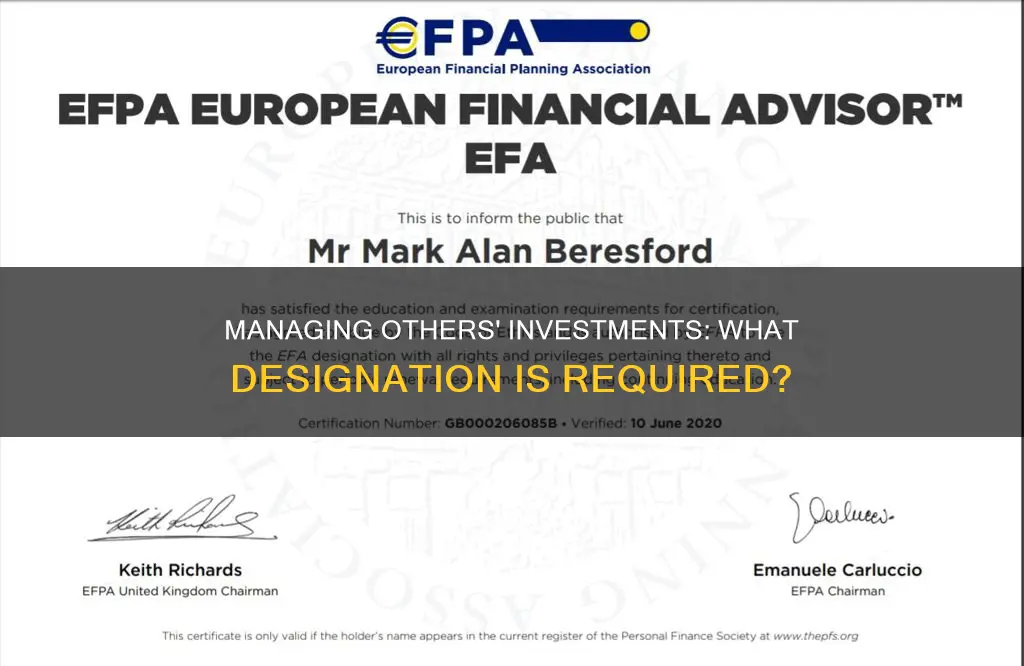
Managing other people's investments is a big responsibility and requires a solid understanding of financial planning, investment management, accounting, insurance, and retirement planning. To become an investment manager, one must obtain the necessary qualifications and register with the relevant regulatory bodies. In the US, this includes the Securities and Exchange Commission (SEC) or the state in which they operate.
There are several designations one can pursue to become an investment manager, each with its own set of requirements, specializations, and benefits. Here are some of the most common designations:
- Certified Financial Planner (CFP)
- Certified Public Accountant (CPA)
- Chartered Financial Analyst (CFA)
- Chartered Life Underwriter (CLU)
- Chartered Financial Consultant (ChFC)
- Certified Employee Benefit Specialist (CEBS)
- Chartered Property Casualty Underwriter (CPCU)
- Registered Representatives
- Commodity Trading Advisor (CTA)
Each designation has its own set of exams, educational requirements, regulations, and ethical standards set by professional bodies. Obtaining these designations can enhance one's credibility, exposure, and potential earnings in the financial services sector. It is important to carefully consider the costs and benefits of earning each designation to make an informed decision.
What You'll Learn

Investment & Wealth Advisors
Investment and wealth advisors are professionals who work in investment firms and manage individual client portfolios. They require specific designations that certify their expertise and allow them to provide investment advice and manage client portfolios. Here are some common designations for investment and wealth advisors:
- Fellow of the Canadian Securities Institute (FCSI): This designation is reserved for leaders in financial services. It indicates that the advisor has extensive knowledge and experience in the industry.
- Chartered Strategic Wealth Professional (CSWP): The CSWP program trains individuals to manage the portfolios of high-net-worth individuals. Advisors with this designation have specialized skills in handling complex investment strategies and serving clients with significant assets.
- Chartered Financial Analyst (CFA): The CFA designation is globally recognized and signifies expertise in portfolio management and investment analysis. Advisors with this designation often work as portfolio managers or analysts for diverse financial institutions.
- Certified Financial Planner (CFP): The CFP is the most widely recognized credential in financial planning. CFPs provide comprehensive financial planning advice and help clients with various aspects such as risk management, insurance planning, investment planning, and retirement savings.
- Chartered Life Underwriter (CLU): The CLU designation is for advisors specializing in life insurance and estate planning. It demonstrates their expertise in these specific areas of financial planning.
It is important to note that while these designations provide a strong foundation for investment and wealth advisors, they should also continuously update their knowledge and stay informed about regulatory changes to effectively serve their clients and adhere to ethical standards.
Ethical and Regulatory Considerations
When managing other people's investments, investment and wealth advisors must adhere to strict ethical and regulatory standards. In the United States, advisors are legally and ethically obligated to comply with the Financial Industry Regulatory Authority's (FINRA) Rule 2111, which mandates that any investment recommendations must be suitable for the client. Advisors must consider the client's risk tolerance, personal preferences, financial situation, and long-term investment goals to create personalized strategies.
Additionally, advisors should maintain clear boundaries and communicate risks and expectations, especially when working with friends and family. It is crucial to treat these clients with the same professionalism as any other client to avoid straining relationships or creating conflicts of interest. Proper registration with regulatory bodies, such as the Securities and Exchange Commission (SEC), is also essential to ensure compliance and protect investors' interests.
Benefits of Designations
Obtaining designations such as the CFP, CFA, or CSWP provides several benefits for investment and wealth advisors. These designations enhance their credibility and exposure in the industry, leading to increased career opportunities and potential earnings. They also assure clients that they are receiving knowledgeable and ethical advice from qualified professionals.
In conclusion, investment and wealth advisors play a crucial role in managing other people's investments. By obtaining relevant designations, such as the FCSI, CSWP, CFA, or CFP, advisors can effectively serve their clients while adhering to ethical and regulatory standards. These designations provide specialized knowledge and skills, enhancing their career prospects and client confidence.
Maximizing Small Savings: Smart Strategies for Investing Wisely
You may want to see also

Investment & Portfolio Managers
Investment and portfolio managers are responsible for making investment decisions for clients and conducting investment analysis. They may manage the portfolios of individual clients, investment funds, or businesses.
Two common designations for investment and portfolio managers are:
- Chartered Financial Analyst (CFA): This designation is given by the CFA Institute and measures the competence and integrity of financial analysts. CFA programs focus on portfolio management and investment analysis. To obtain this designation, candidates must have a four-year college degree, at least four years of professional work experience, and an international travel passport. The program consists of three exams, covering various topics, including ethical and professional standards, economics, financial reporting, corporate finance, equity investments, and wealth planning.
- Chartered Investment Management (CIM): The CIM designation also focuses on portfolio management and investment analysis. While specific requirements for this designation are not mentioned, it is likely that candidates need to meet certain educational and professional standards.
Invest Wisely to Secure Grandkids' College Education
You may want to see also

Financial Planners
The most common professional designation for financial planners is the Certified Financial Planner (CFP) credential. CFPs must adhere to strict education and training standards, including holding at least a bachelor's degree or having at least three years of full-time financial planning experience. They must also complete 30 hours of continuing education every two years. The CFP certification is issued by the Certified Financial Planner Board of Standards, a nonprofit certifying and standards-setting organisation that administers the CFP exam.
When choosing a financial planner, it is important to consider their credentials, disciplinary history, and specialisations. The CFP designation indicates that a provider has gone through rigorous formal training and testing and is held to high ethical standards. Other designations may require little experience, study, or continuing education and may lack processes for verifying credentials or filing complaints.
It is also important to understand the services a financial planner offers. Some create comprehensive plans that cover all aspects of a client's financial life, while others have a more limited focus, such as insurance or securities. Some financial planners only prepare plans, while others also sell investments, insurance, or other products. If they sell products, their recommendations will typically correspond to the products or services they offer.
In summary, when choosing a financial planner, it is important to consider their credentials, regulatory status, services offered, and compensation structure. The CFP designation is a widely recognised indicator of rigorous training and ethical standards in the field of financial planning.
Venture Capital: Asset or Investment Management?
You may want to see also

Insurance, Health, & Estate Advisors
When it comes to managing other people's investments, there are a few key designations to be aware of, especially in the areas of insurance, health, and estate planning. Here are some detailed explanations of these designations:
Insurance
In the insurance industry, a key designation to manage other people's investments is that of an insurance broker or agent. These individuals are licensed professionals who act as intermediaries between insurance companies and their clients. They help clients navigate the complex world of insurance policies, including health insurance, life insurance, property insurance, and more. Insurance brokers and agents must have a thorough understanding of different insurance products, regulations, and the needs of their clients to effectively manage their investments in this area.
Health
In the health sector, managing other people's investments may involve designations such as health insurance brokers or consultants. These professionals advise individuals, families, or businesses on selecting and managing their health insurance plans. They help clients understand the often complex world of health insurance policies, coverage options, and industry regulations. By providing this expertise, health insurance brokers and consultants enable their clients to make informed decisions about their health care investments.
Estate Planning
Estate planning often involves managing other people's investments, and there are a few designations to consider in this area:
- Estate Planning Attorney: These legal professionals specialize in estate law and help clients create comprehensive estate plans. They guide individuals through the process of drafting wills, establishing trusts, designating beneficiaries, and ensuring their investments are distributed according to their wishes upon their death.
- Wealth Management Advisor: Managing investments is a key aspect of wealth management. These advisors work with clients to create financial plans that align with their goals and risk tolerance. They provide advice on investment strategies, asset allocation, and tax implications to help individuals grow and protect their wealth.
- Trustee: A trustee is appointed to manage the assets held in a trust. They have a fiduciary duty to act in the best interests of the beneficiaries and ensure that the trust's investments are managed and distributed according to the grantor's wishes.
In conclusion, managing other people's investments in the areas of insurance, health, and estate planning requires specialized knowledge and designations. It is important to seek professionals with the appropriate credentials and expertise to ensure effective management and protection of their clients' investments.
Savings and Investment: Understanding the National Identity
You may want to see also

Accountants
To become an accountant and manage other people's investments, you typically need a bachelor's degree in accounting or a related field. Some common designations for accountants include:
- Certified Public Accountant (CPA): This is one of the most common and well-known designations for accountants. To become a CPA, you must pass a uniform examination and meet other state requirements. CPAs can perform a wide range of accounting tasks, including auditing financial statements, preparing tax returns, and providing financial advice to clients.
- Chartered Accountant (CA): This designation is recognized internationally and is considered a mark of high professional standards. To become a CA, you typically need a degree in accounting or a related field, as well as several years of practical experience. CAs can offer a range of services, including financial and operational advice, auditing, and tax planning.
- Certified Management Accountant (CMA): This designation is specifically for accountants who want to work in management accounting. CMAs typically work in businesses, helping to manage finances and make strategic decisions. To become a CMA, you must pass a rigorous exam and meet education and experience requirements.
- Accredited Chartered Accountant (ACCA): ACCAs provide financial advice to clients and work with businesses and individuals to ensure compliance with regulations. To become an ACCA, you must complete a series of exams and ethical modules, as well as gain relevant work experience.
While these are some of the most common designations, there are several other specialized certifications and licenses that accountants may pursue depending on their specific area of practice. It is important to research the requirements and qualifications for each designation to determine the best path for your career goals.
Wealth Management: Exploring Investment Vehicle Options
You may want to see also
Frequently asked questions
Some common designations include Certified Financial Planner (CFP), Chartered Financial Analyst (CFA), and Chartered Life Underwriter (CLU).
A CFP is a credential for financial planners who create financial plans for their clients, which may include tax, estate, and retirement planning.
To become a CFP, you must have a bachelor's degree, complete college-level coursework, pass a board exam, gain professional experience, and complete continuing education every two years.
A CFA is a designation for financial analysts and portfolio managers. They provide investment advice and make investment decisions for clients.
To become a CFA, you need a four-year college degree, at least four years of professional work experience, and an international travel passport. You must also pass three exams.
These are just a few examples of the designations and requirements for professionals who manage other people's investments. Each designation caters to different specialties and areas of expertise within the financial services industry.







